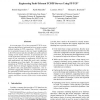Free Online Productivity Tools
i2Speak
i2Symbol
i2OCR
iTex2Img
iWeb2Print
iWeb2Shot
i2Type
iPdf2Split
iPdf2Merge
i2Bopomofo
i2Arabic
i2Style
i2Image
i2PDF
iLatex2Rtf
Sci2ools
111
click to vote
DSN
2003
IEEE
2003
IEEE
Engineering Fault-Tolerant TCP/IP Servers Using FT-TCP
In a recent paper [2] we have proposed FT-TCP: an architecture that allows a replicated service to survive crashes without breaking its TCP connections. FT-TCP is attractive in principle because it does not require modifications to the TCP protocol and does not affect any of the software running on the clients; however, its practicality for realworld applications remains to be proven. In this paper, we report on our experience in engineering FT-TCP for two such applications—the Samba file server and a multimedia streaming server from Apple. We compare two implementations of FT-TCP, one based on primary-backup and another based on message logging, focusing on scalability, failover time, and application transparency. Our experiments suggest that FT-TCP is a practicable approach for replicating TCP/IP-based services that incurs low overhead on throughput, scales well as the number of clients increases, and allows recovery of the service in near-optimal time.
Related Content
| Added | 04 Jul 2010 |
| Updated | 04 Jul 2010 |
| Type | Conference |
| Year | 2003 |
| Where | DSN |
| Authors | Dmitrii Zagorodnov, Keith Marzullo, Lorenzo Alvisi, Thomas C. Bressoud |
Comments (0)

